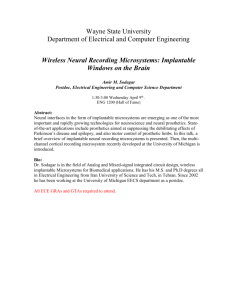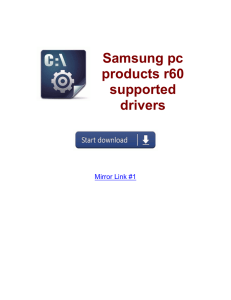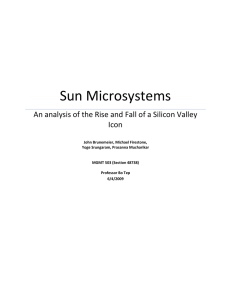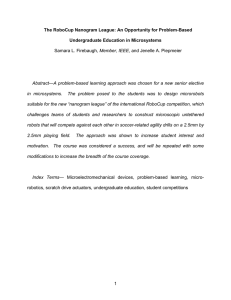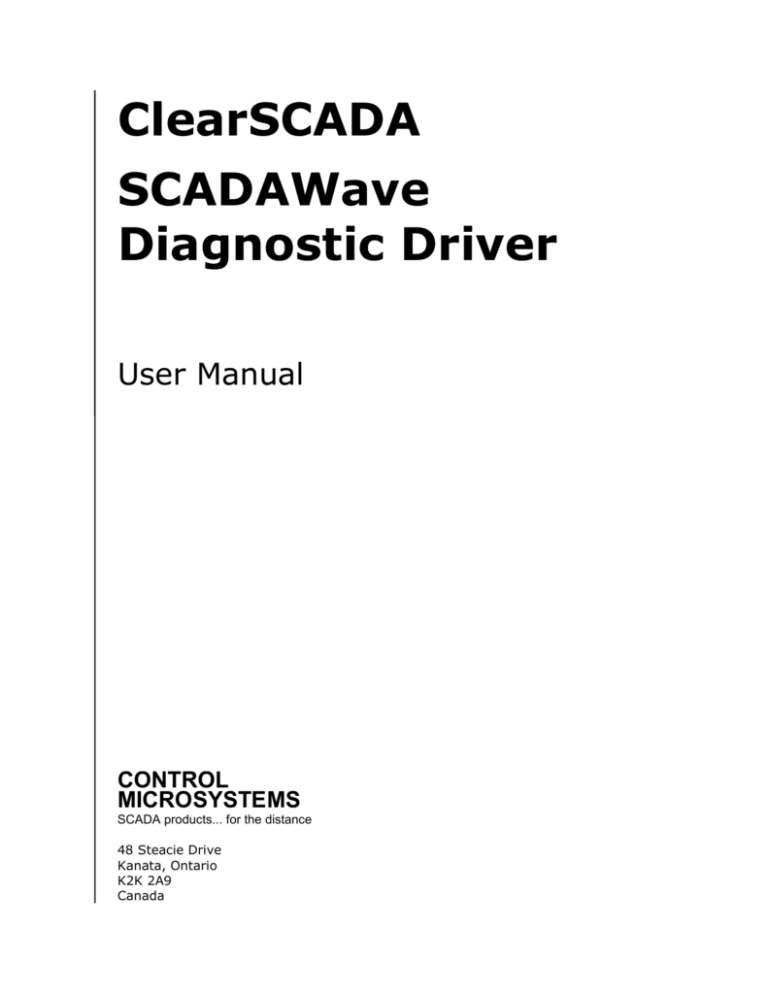
ClearSCADA
SCADAWave
Diagnostic Driver
User Manual
CONTROL
MICROSYSTEMS
SCADA products... for the distance
48 Steacie Drive
Kanata, Ontario
K2K 2A9
Canada
©2008, Control Microsystems Inc.
All rights reserved.
Printed in Canada.
Trademarks
TelePACE, SCADAServer, SCADALog, RealFLO, TeleSAFE, TeleSAFE Micro16,
SCADAPack, SCADAPack Light, SCADAPack Plus, SCADAPack 32, SCADAPack 32P,
SCADAPack LP, SCADAPack 100, 4202GFC, 4102MMT, 4012MPT, 4012MPT, 4022MPT,
4022MPT, 4032MPT, 4052MPT, 4062MPT and TeleBUS are registered trademarks of
Control Microsystems Inc.
All other product names are copyright and registered trademarks or trade names of
their respective owners.
Document Revised March 9, 2016
Table of Contents
1.
OVERVIEW ............................................................................1
Driver Architecture ........................................................................ 1
2.
INSTALLATION .....................................................................3
3.
CLEARSCADA OBJECTS AND DATABASE CONFIGURATION ....4
3.1.
Channel ............................................................................ 4
3.2.
Radio ................................................................................ 6
3.3.
Analog Points ..................................................................... 7
3.4.
Digital Points ..................................................................... 8
3.5.
String Points ...................................................................... 8
Confidential – Control Microsystems Use Only
i
1. Overview
This document describes the ClearSCADA SCADAWave Diagnostic driver,
for use with Trio and SCADAWave radios.
The driver communicates with E-Series, M-Series and K-Series
SCADAWave radios, and retrieves diagnostic information from these
radios.
This driver has been implemented to conform with “Remote Diagnostics
Protocol Version 2”, as described in the “E-Series Remote Diagnostics
Interface Specification (Version D)” document published by Trio Datacom
Pty Ltd.
Driver Architecture
The driver supports serial RS232 communications for direct serial
connection, as well as TCP/IP communications for remote connection via
a terminal server.
ClearSCADA
Server
RS-232
System Port
SCADAWave / Trio
Gateway Radio
Remote Radio Network
Figure 1: Driver using RS-232 connection
Confidential – Control Microsystems Use Only
1
ClearSCADA
Server
Ethernet network
TCP/IP comms
Terminal Server
(eg. SCADAPack ES
or eNET RTU)
Server
RS-232
System Port
SCADAWave / Trio
Gateway Radio
Remote Radio Network
Figure 2: Driver using TCP/IP connection
Confidential – Control Microsystems Use Only
2
2. Installation
The Windows Installer supplied with this driver will install the following
files in the ClearSCADA directory on the target machine :
DriverSCADAWaveDiag.exe
SCADAWaveDiag.dll
Install_SCADAWaveDiag.bat
After this installation has completed, it is necessary to run the
Install_SCADAWaveDiag.bat batch file to register the database module
so that ClearSCADA can load it.
Confidential – Control Microsystems Use Only
3
3. ClearSCADA objects and
database configuration
Once the driver has been installed and registered, a new sub-menu will
appear in the list of ClearSCADA objects.
3.1. Channel
The channel defines a connection for diagnostic communications on a
SCADAWave radio system. Each channel can allow diagnostics to a
network of radios through a single gateway radio.
Confidential – Control Microsystems Use Only
4
Maximum Frame Size specifies the maximum size in bytes of message
frames permitted over the radio network. The SCADAWave radios are
typically limited to a frame size of 64 bytes.
Number of Retries / Timeout specify the number of times that
ClearSCADA will retry messages and the timeout delay that ClearSCADA
will wait before indicating that a message has failed.
Connection Type should be set to Serial for a direct RS-232 serial
connection to a gateway radio; or to TCP/IP for connecting remotely via a
terminal server over a TCP/IP network.
Confidential – Control Microsystems Use Only
5
3.2. Radio
The radio object defines the parameters for the gateway radio.
Confidential – Control Microsystems Use Only
6
Channel specifies the link to the channel object.
Serial Number specifies the identifier (serial number) of the radio.
Scan Rate and Scan Offset define the frequency of requesting
diagnostic information from the radio.
3.3. Analog Points
The following analog points are supported
Parameter Name
Description
PIC
Temperature (deg C)
Internal temperature of radio
3
RSSI (dBm)
Received signal strength
6
Forward Tx Power
Tx power (in dBm or mW)
9
Reverse Tx Power
Reverse Tx power (in dBm or mW)
18
Rx Frequency Error (Hz)
Rx Frequency error
15
DC Supply Volts (V)
Radio supply voltage
12
Tx Frame Count
Number of transmitted frames
48
Tx Byte Count
Number of transmitted bytes
49
Bad Frame Count
Number of bad frames received
51
Good Frame Count
Number of good frames received
52
Good Byte Count
Number of good bytes received
53
Lost Sync Count
Number of time sync has been lost
54
Lost RSSI Count
Number of times RSSI has been lost
55
Tx Frequency (Hz)
Transmit frequency
62
Rx Frequency (Hz)
Receive frequency
63
Programmed Tx Power
Programmed transmit pwr (dBm or mW)
64
RSSI Threshold (dBm)
RSSI threshold
76
Session Code
Session code
98
Run Time Tx Power
Real time Tx power (dBm or mW)
104
Base Serial No.
Base serial number
126
DSP Firm. Ver.
DSP firmware version
156
DSP Firm. Rev.
DSP firmware revision
157
Base Firm. Ver.
Base station controller firmware version
161
Max Tx Power
Maximum transmit power (dBm or mW)
200
Confidential – Control Microsystems Use Only
7
3.4. Digital Points
The following digital points are supported
Parameter Name
Description
PIC
User Diags Enabled
User diagnostics are enabled (disabled)
198 bit 0
Unit is Base
Unit is a base station (not a base station)
198 bit 1
Auto Annunciate
Auto Annunciate on (off)
102 bit 0
Diag. Checksum Enabled
Diagnostics checksum enabled (disabled)
102 bit 1
Unit is Exciter
Half Duplex
Unit is an exciter (not an exciter)
Unit is operating in half duplex mode (full
duplex mode)
102 bit 2
102 bit 3
3.5. String Points
The following string points are supported
Parameter Name
Description
PIC
Firmware Ver.
Firmware version
190
Processor Module Desc.
Processor module description
122
Main Board ID
Main board identification string
143
Product Ver.
Product version string
192
Base Product Ver.
Base station product version
191
Confidential – Control Microsystems Use Only
8

